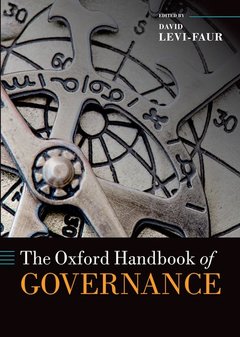Description
The Oxford Handbook of Governance
Oxford Handbooks Series
Coordinator: Levi-Faur David
Language: English
Subject for The Oxford Handbook of Governance:
Publication date: 03-2012
828 p. · 17.9x25.2 cm · Hardback
828 p. · 17.9x25.2 cm · Hardback
Description
/li>Contents
/li>Biography
/li>
The Oxford Handbook of Governance presents an authoritative and accessible state-of-the-art analysis of the social science literature on governance. The volume presents the core concepts and knowledge that have evolved in the study of governance in different levels and arenas of politics and policymaking. In doing so it establishes itself as the essential point of reference for all those studying politics, society, and economics from a governance perspective. The volume comprises fifty-two chapters from leaders in the field. The chapters are organized in nine sections dealing with topics that include governance as the reform of the state, democratic governance, European governance, and global governance.
Forward. PART I: INTRODUCTION. 1. From "Big Government" to "Big Governance?". 2. Governance as a Political Theory. 3. Waves of Governance. 4. The Many Faces of Governance: Adaptation? Transformation? Both? Neither?. 5. New Governance as Regulatory Governance. 6. Governance: An Interdisciplinary Perspective. PART II: Theoretical Lenses. 7. Governance Networks. 8. Information and Governing: Cybernetic Models of Governance. 9. Governance and Complexity. 10. Good Governance. 11. Governance and Learning. 12. Experimentalist Governance,. PART III: GOVERNANCE AND THE REFORM OF THE STATE. 13. Governance and Institutional Flexibility. 14. New Public Management and Governance: a Comparison. 15. Governance and Innovation in the Public Sector. 16. Governance and State Structures. 17. New governance and policy instruments: Are Governments Going 'Soft'?. 18. Governance aamp, Administrative Reforms. 19. Governance and Patronage. 20. Governance and State Capacity. 21. The Impact of Governance. PART IV: ACTORS, STRATEGIES AND GOVERNANCE STYLES. 22. New Governance or Old Governance? A Policy Style Perspective. 23. NGOs: Between Advocacy, Service Provision and Regulation. 24. Actors of Knowledge. PART V: ECONOMIC GOVERNANCE. 25. The Governance of Markets: On Generating Trust in Transactions. 26. Governance after the Crisis. 27. Modes of Economic Governance: The Dynamics of Governance at the National and Firm Level. 28. The Governance of Central Banks. PART VI: GOVERNANCE OF RISKS. 29. Risk and Governance. 30. Governance of Science and Technology. 31. The Governance of Global Climate Change. PART VII: DEMOCRATIC GOVERNANCE. 32. Participatory Governance: From Theory to Practice. 33. Modes of Democratic Governance. 34. The New Citizenship and Governance: Alternative Intersections. 35. Collaborative Governance. 36. The Democratic Quality of Collaborative Governance. 37. Participatory Governance in Public Health: Choice, but no Voice. 38. A Return to Governance in the Law of the Workplace. 39. Governance and Voluntary Regulation. 40. E-Governance and E-Democracy: Questioning Technology-centered Categories. 41. The Fifth Estate: A New Governance Challenge. 42. The Governance of Privacy. PART VIII: EUROPEAN GOVERNANCE. 43. The European Union - A Unique Governance Mix?. 44. Multi Level Governance in the European Union. 45. Institutional Change in European Governance: The Commission#s Implementing Powers and the European Parliament, European University Institute. 46. EU External Governance and Europeanization Beyond the EU. PART IX: GLOBAL GOVERNANCE. 47. Governance and Global Policy. 48. Governance, International Order, and World Order. 49. Governance in Areas of Limited Statehood. 50. Governmentality in Global Governance. 51. Global Governance as Multi Governance. 52. The Challenges of Transnational Economic Governance.
David Levi-Faur is a founding editor of the journal Regulation & Governance. He is based at the Department of Political Science and the Federmann School of Public Policy and Government at the Hebrew University. He is currently a Senior Fellow at the Kolleg-Forschergruppe "The Transformative Power of Europe " the Free University of Berlin.
© 2024 LAVOISIER S.A.S.




